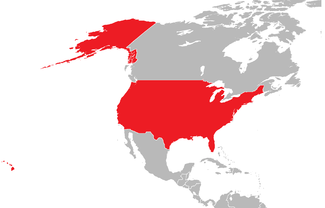
Isolationism means avoiding entanglement in foreign conflicts, particularly foreign wars. It is the opposite of a interventionalist foreign policy.
Pointless and costly wars such as the Iraq War and War in Afghanistan are very expensive. I agree with Donald Trump's policy of not using the American military to "solve ancient conflicts in faraway lands".[1]
Questions: Is isolationism growing in the United States? If so, is this a good thing or a bad thing?
Growing trend of Americans favoring a more isolationist foreign policy
Recent data shows isolationist beliefs in the United States have increased steadily from 28% of respondents in 2019 to 40% at the end of 2021. A recent report also indicates that prior to 2016, the American National Election Studies – a time series dating back to 1952 – has never found more than 30% of Americans holding isolationist beliefs."[2]
Consider the 2022 The Hill opinion article Republicans are the new isolationists; will US retreat from world stage?:
| “ | The world is facing the most serious threat of nuclear confrontation since the Cuban missile crisis 60 years ago. At the same time, we’re seeing a growing isolationist movement in the U.S. The Republican Party has been taken over by Donald Trump and his army of right-wing populists.
The GOP is becoming an isolationist party. It is no longer the party that embraces the bold foreign policy of Ronald Reagan or the Bushes. By more than two to one, Republicans endorse the view that “We should pay less attention to problems overseas and concentrate on problems here at home.” Only 30 percent of Republicans believe “It is best for the future of our country to be active in world affairs.”[3] |
” |
Also: "Their initial data, collected by students conducting individual interviews, surprised Mutz: It found that American adults ages 18-30 tend to favor isolationist foreign policy, regardless of where they fall on the political spectrum, when compared with Baby Boomers, aged 60+"...“At least for the last half of the 20th century, Americans 60 and older were more isolationist than younger adults,” says Mutz, the Samuel Stouffer Professor of Communication and Political Science and director of the Institute for the Study of Citizens and Politics at Penn. “But now things have reversed." - Penn Students Research Which Americans Are Most Isolationist — and It May Not Be Who You Think
A 2023 article in the The Hill stated:
| “ | A few weeks ago, Rep. Matt Gaetz introduced an amendment to a defense funding bill prohibiting all military aid to Ukraine. 93 House Republicans voted in favor of the amendment...
Nonetheless, with former President Trump leading the way, an isolationist faction of the Republican party in the House has doubled down on its “just say no” strategy. In July, Trump maintained that if elected again he would instantly bring the conflict to an end:“I would tell Zelensky, no more. You got to make a deal. I would tell Putin, if you don’t make a deal, we’re going to give him a lot … I will have the deal done in one day. One day.” When Vladimir Putin praised this statement, Trump replied, “Well, I like that he said that. Because that means what I’m saying is right.” The former president also ordered Republicans in Congress to oppose all aid to Ukraine “until the FBI, DOJ, and IRS hand over every scrap of evidence they have on the Biden Crime Family’s corrupt business dealings.” Any lawmaker who does not go along, Trump added, should expect a primary challenge in 2024.[4] |
” |
As the American baby boomers die off and lose power, the USA might become more isolationist.
Of course, isolationism, like anything taken to an extreme, can be a bad thing. The United States should stay engaged in the world - especially when it comes to the use of skillful diplomacy. At the same time, sometimes wars are unavoidable, but when a nation engages in a war, it should be a just war (See: Just War Theory).
United States and the growing trend of onshoring manufacturing
A country that can better meet its needs using domestic sources is in a better position to have a less interventionist foreign policy.
The United States is reshoring its supply chains and producing more things domestically for several reasons and this will give it more security from foreign disruptions.[5] First, due to Covid-19 disruptions in production in China. Furthermore, China is facing an aging populations with a shortage of workers due to their previous One-child Policy. East Asia as a whole with its subreplacement level of births will also face labor problems in the future as well. As a result, America will face a lower risk of its supply chains disruptions due to countries not being able to keep up with demand or foreign powers militarily disrupting its supply chains. The net result of this is the USA will have a lower need to project its power overseas. The USA having less of a need to be the world's supply chain protector and policeman will cause a less globalized economy and more of an emphasis on regional/local economies. See: The Greatest Reindustrialization Process in US History (Video) and A New Wave of Reshoring for US Manufacturers and McKinsey Study: Shortened Supply Chains are Coming
USA's abundant natural resources and geographical defenses makes it easier for it to have an isolationist foreign policy than many nations
The less a country is dependent on critical natural resources, the better able it is to have a less interventionalist foreign policy.
USA's abundant natural resources. See: U.S. Natural Resources and The USA is outproducing Russia and Saudi Arabia in oil production. The best is yet to come
USA's natural defenses: Two big oceans and a friendly northern neighbor with a big country to help protect it. In addition, China's and Russia's navies are inferior to the U.S. Navy.[6][7] See: The U.S. Navy is the most powerful navy in the world

The USA has a diversified economy which makes it easier to weather external economic shocks. This makes an interventionalist policy less compelling for the United States
See also: United States and innovation

Read the articles: The Importance Of A Diversified Economy and Resilient, stable, sustainable: The benefits of economic diversification
The USA has a diversified economy which makes it easier to weather external economic shocks. This makes an interventionalist policy less compelling for the United States. Japan and Switzerland which also have highly diversified economies haven't been at war in many years (But they also have natural geographical defenses like the United States).
George Washington on the danger of foreign entanglements
"It is our true policy to steer clear of permanent alliance with any portion of the foreign world." - George Washington, Farewell Address | Monday, September 19, 1796
Editorial notes: "Washington's admonition to Americans to avoid foreign entanglements stemmed from his own personal experience. He knew first hand how costly wars could be and wanted the young nation to maintain a goal of neutrality with all foreign governments as much as possible. Washington continued his commentary by noting: "so far, I mean, as we are now at liberty to do it; for let me not be understood as capable of patronising infidelity to existing engagements" - Washington still intended for the United States to honor all existing international treaties." - George Washington, Farewell Address, Monday, September 19, 1796
Just War Theory: Jus ad bellum - Is a war just?
See also: Just War Theory
Just War Theory consists of two primary components, first determining if a war may be justly conducted (jus ad bellum) and how it must be conducted (jus in bello). It is based largely on the work of Augustine.
Under jus ad bellum, only legitimate authorities can wage war for the right reasons (usually this means a defensive war, or a war of defending the weak against a violent oppressor [9]) and only as a last resort if every other peaceful means to avert war have been used to no avail. A just war can only be waged if there is a serious evil that needs to be stopped. Further there must be a realistic chance that the evil can be stopped without starting a greater evil. If this happens the war reaches a just conclusion. A war started for just reasons and justly waged may still reach an unjust conclusion.
Is the USA becoming more isolationist a good thing?
"I am not an isolationist, but the logic underpinning this grand strategy is not easy to dismiss. Quite the contrary, as President Franklin Roosevelt discovered in the early 1940s, when he had great difficulty countering the isolationists. It is commonplace today to dismiss those isolationists as fools or even crackpots. But that would be a mistake. They were wrong to think the United States could sit out World War II, but they made a serious case for staying on the sidelines…If the case for isolationism was powerful before Pearl Harbor, it is even more compelling today." - Professor John Mearsheimer, University of Chicago, 2014, Source: Mearsheimer Not Worried About Isolationism
"Our foreign policy calls for a direct, robust, and meaningful engagement with the world. It is American leadership based on vital security interests that we share with our allies all across the globe." - Donald Trump, President Donald J. Trump at the United Nations General Assembly: Outlining an America First Foreign Policy
"No man is an island, entire of itself; every man is a piece of the continent, a part of the main. If a clod be washed away by the sea, Europe is the less, as well as if a promontory were, as well as if a manor of they friends`s or of thine own were. Any man`s death diminishes me, because I am involved in mankind." - John Donne (1572 - 1631)
Why the USA foreign policy should be less interventionalist

The George W. Bush years had the USA engaged in pointless and costly wars in Iraq and Afghanistan. In addition, it tried to engage in nation-building in cultures with cultures much different from the West without even gaining substantial control of the countries. The denazification of Germany post WWII and the USA Occupation and Reconstruction of Japan, 1945–52 occurred in countries that lost their wars. Furthermore, General Douglas MacArthur, was very diplomatic towards the Japanese and the Japan public respected him (See: American Shogun: Reasons Why the Japanese were Fascinated with General MacArthur).
After the Munich Massacre, Israel launched Operation Wrath of God, a series of clandestine activities directed at members of Black September and the Palestine Liberation Organization. The USA could have done something similar post 9-11. And ultimately, Osama Bin Laden was killed by USA forces in Pakistan.
Pointless and unjust wars are expensive. The USA needs to pay down more of its debt
See also: National debt of the United States and Federal Debt Limit and the USA can reduce its national debt. It has done it before
During World War II, federal debt peaked at 106% of gross domestic product in 1946.[10] It was not until the early 21st century that the US finally paid off its debt from World War II.[1]
It will take decades for Americans to pay off the national debt of the United States if this happens. And it will require Americans retiring later, defense budget cuts, a merit-based legal immigration system (Winning sports teams bring in the best players), and pro-growth economic policies. The failed presidency of Jimmy Carter was followed by 12 years of Republican rule. I am hoping that Joe Biden's failed presidency leads to a similar string of Republican victories. But time will tell. American economic growth will go a long way to help pay back America's national debt and today's left-leaning Democrats are a drag on the USA economy.
Watch the videos which give an overview of America's federal debt problem:
- Does National Debt Still Matter? America's Gamble, libertarian/small government view, ReasonTV
- The US Debt Situation Explained, Discusses dangers and not being super/overly concerned. Essentially argues Americans should be concerned and fix the problem, but not be panicked.
For more information, please see: the USA can reduce its national debt. It has done it before

Other essays: The United States
- The United States will be the leading power in the world for the foreseeable future
- Is the USA an economic powerhouse and juggernaut?
- Size of a working age population in a country and its correlation with national GNP in advanced economies. The ability of the United States to attract some of the best and brightest workers in the world
- Top 12 reasons why people are flocking to the USA and leaving the corrupt, authoritarian countries of China and Russia
- The USA is outproducing Russia and Saudi Arabia in oil production. The best is yet to come
- The USA can reduce its national debt. It has done it before
- The citizens of the United States are happier than the citizens of Russia and China. USA! USA! USA!
- The U.S. Navy is the most powerful navy in the world
- Gold reserves by country. The USA is still golden!
References
- ↑ Trump to West Point grads: 'We are ending the era of endless wars', Reuters, June 13, 2022
- ↑ Rising US isolationism means Australia must become more resilient and autonomous, thinktank warns, The Guardian, 2022
- ↑ Republicans are the new isolationists; will US retreat from world stage?
- ↑ The tyranny of the GOP isolationist minority, The Hill, 2023
- ↑
- The Greatest Reindustrialization Process in US History, video
- U.S. Manufacturers Reshoring, But It Will Take A Long Time, Forbes, August 19, 2023
- Firms are bringing production back home because of the Ukraine war, China’s slowdown — and TikTok, NBC News, June 1, 2023
- Reshoring and Restoring U.S. Manufacturing, October 23, 2023
- A New Wave of Reshoring for US Manufacturers
- Trade and Reshoring in the USA, video
- Reshoring Alleviates Supply Chain Issues – But It Needs Tech to Control Costs, eWeek, August 10, 2023
- McKinsey Study: Shortened Supply Chains are Coming
- The Future of Ohio: Manufacturing Growth and Political Shifts || Peter Zeihan
- ↑ Top 10 Navies in the World. Military Today website]
- ↑ Top 10 Most Powerful NAVY In The World 2022, video
- ↑ Countries With The Most Diverse Economies
- ↑ Proverbs 24:11 and commentaries; see also Psalm 82:4 and Job 29:17.
- ↑ This is not your grandfather’s debt problem By Eugene Steuerle, Washington Post, 2020


